Search
Did you mean: Augustus?
Search Results

Image
Fort Mose Historic State Park, St. Augustine, Florida, USA
Fort Mose Historic State Park: St. Augustine, Florida, USA: The clump of trees is where the remains of the fort are located. Fort Mose, the first Free Black Community in North America, was most likely the destination of the rebels under Cato/Jemmy...

Video
Saint You Should Know: Augustine of Hippo
St. Augustine did not live the sort of life that you would expect from a saint and doctor of the Church. And yet, his life witnesses to the incredible power of God to convert our hearts and transform sinners into incredible disciples.

Article
The Christian Concept of Human Sexuality as Sin
In the ancient world, human sexuality was crucial for the survival of the tribe and clan as well as pleasurable, a gift from the gods. Thousands of native cults emphasized fertility through rituals and prayers, and ancient gods were depicted...

Article
Youth of George Washington
The youth of George Washington (1732-1799), the first President of the United States, remains the least understood chapter of his life, shrouded in folklore and myths. Yet the experiences of his youth, and the bond he felt toward his older...

Definition
Stono Rebellion
The Stono Rebellion (also known as Cato's Rebellion or Cato's Conspiracy, 9 September 1739) was the largest slave revolt in the British colonies of North America. Led by an educated slave, Cato (also known as Jemmy), enslaved Black people...

Article
Christian Antisemitism in the Middle Ages & during the Reformation
Antisemitism is a modern term that describes prejudice and hostility to Jews and Judaism. The origins of Christian antisemitism in the gospels are based on the story of a 1st-century itinerant Jewish preacher, Jesus of Nazareth, in the Roman...

Article
The Splendours of Roman Algeria
Algeria, Africa's largest country, stretches from the Mediterranean coastline to the Saharan desert interior. The country has some of the finest and most diverse Roman sites, including Timgad and Djémila, both well-preserved and UNESCO-listed...

Article
Luther's 97 Theses
Martin Luther's 95 Theses, credited with sparking the Protestant Reformation in Europe, have become a cultural touchstone since he posted them 31 October 1517, but the little-known 97 Theses, posted only a month earlier, are equally significant...

Article
North Africa During the Classical Period
Phoenician traders arrived on the North African coast around 900 B.C. and established Carthage (in present-day Tunisia) around 800 B.C. By the sixth century B.C., a Phoenician presence existed at Tipasa (east of Cherchell in Algeria). From...

Definition
Bede
Bede (c. 673-735 CE) was an English monk, historian, and scholar who lived in the Kingdom of Northumbria. He is at times referred to as the Venerable Bede or Bede the Venerable. He was a monk at the double monastery of Monkwearmouth-Jarrow...